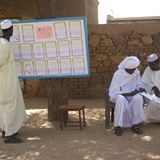(18 May 2016) During the second week of May, the Sudanese National Intelligence and Security Services (NISS) confiscated the independent daily Algareeda newspaper five times without giving any official reason. Printed copies of the newspaper were confiscated by the NISS on 9 and 10 May 2016. The newspaper was allowed to publish on 11 May 2016, before daily issues were confiscated again on 12 and 13 May 2016. The costs of the confiscations are estimated to be roughly 70,000 Sudanese pounds (approximately $10,837).
On 14 May 2016, Asharaf Abdulaziz, Chief Editor of Algareeda, announced that the newspaper would not publish on 14 and 15 May 2016 to protest ongoing censorship by the Sudanese authorities. The NISS confiscated the newspaper for the fifth time on 16 May. The newspaper resumed publishing and distribution on 17 May, and was also published today, 18 May 2016.
While no formal reasons have been given, it is very likely that the confiscations relate to the editorial stance of the newspaper, which has refused to self-censor its content. Post-print censorship, when a newspaper’s edition is either prevented from distribution or confiscated after being printed, causes significant financial losses to media outlets and encourages self-censorship, as editors may grow reluctant to publish articles which may lead to their editions being confiscated. Algareeda is one of just two print newspapers independent of any political party in Sudan.
In April, a local “wall” newspaper in Al Fashir, North Darfur, was also subjected to censorship, with its Chief Editor, Ms. Awaif Ishag, arrested and interrogated. On 11 April 2016 the NISS took down copies of Alrahil newspaper, known as a “wall” newspaper in El Fashir, which has been printed and displayed for readers on the wall outside the home of its Chief Editor since 1995. Ms. Awaif Ishag was arrested from her home and taken to the NISS offices in El Fashir town where she was interrogated for two hours and accused of inciting mistrust in the referendum process. Her personal lap-top, containing soft copies of back-issues of the paper since 2005 and her PhD thesis, was also confiscated. The censorship is believed to be linked to articles in Alrahil on the Darfur referendum entitled “The Darfur Referendum: between fact and reality” and “Focus before you vote”.
The African Centre for Justice and Peace Studies (ACJPS) calls on the Government of Sudan to end all censorship and harassment of media outlets, and fully guarantee the right to freedom of expression as set out in Sudan’s Interim National Constitution of 2005, as well as international and regional human rights treaties to which Sudan is a state party.
Background
In recent years, it has become a daily ritual for NISS officers to visit Khartoum’s printing houses in the early morning hours to seize print runs or prevent the distribution of morning papers without giving any reasons. Post-print censorship is routinely used by the NISS to intimidate editors from publishing on what are often referred to as ‘red line’ issues, which are issues that the authorities deem sensitive and seek to control in public debate. It is also thought to have the intended impact of causing editors to self-censor to avoid financial losses. Though the issues deemed ‘red line’ are often blurry and unclear, current themes subjected to censorship include any coverage of the armed conflict in Darfur, South Kordofan, and Blue Nile states and the actions of the Sudanese Armed Forces, references to the International Criminal Court (ICC), and reports of corruption.
The NISS has increasingly sought to censor not only independent newspapers or those affiliated to opposition political parties, but also those that are traditionally supportive of or affiliated to the ruling National Congress Party (NCP). In April 2016, newspapers were prevented from publishing information on the arrests of students at Khartoum University.
A number of Sudanese laws restrict the right to peaceful expression, association and assembly, including provisions of the 1991 Sudanese Penal Code and the 2009 Press and Publications Act.
Contact:
Katherine Perks, ACJPS Programme Director, +256 775072136, info@acjps.org
 African Centre for Justice and Peace Studies ACJPS | المركز الافريقي لدراسات العدالة و السلام
African Centre for Justice and Peace Studies ACJPS | المركز الافريقي لدراسات العدالة و السلام




